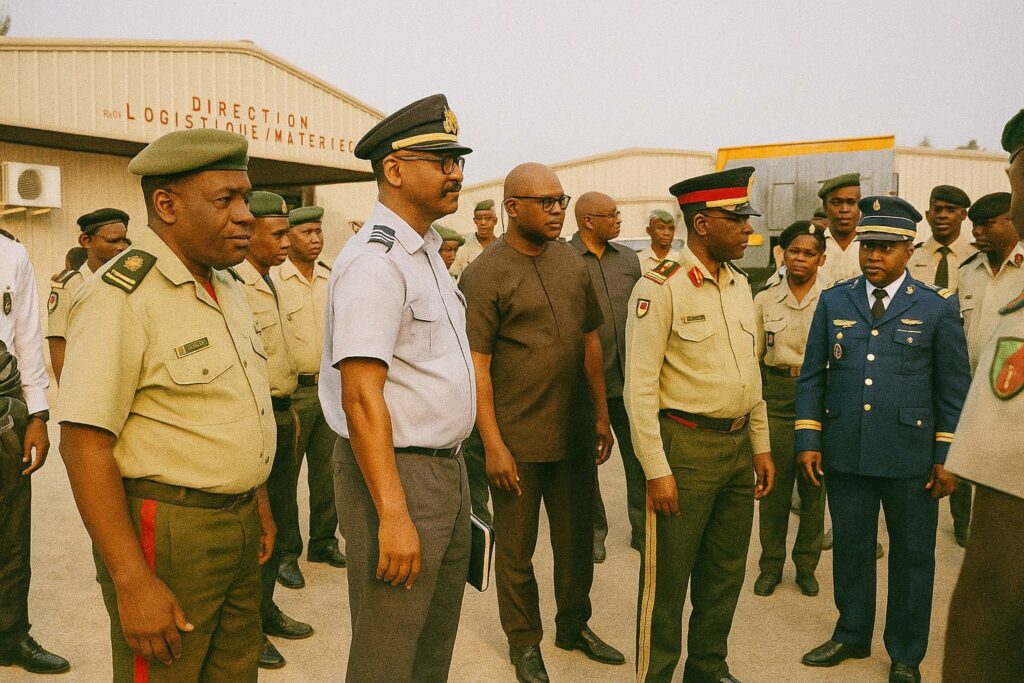A Symbolic Reunion of Old Allies
When Brigadier-General Francis Chakauya led twenty-two Zimbabwean officers across the manicured parade ground of Brazzaville’s Marien-Ngouabi Military Academy in late June, it was more than an academic courtesy call. The Republic of the Congo and Zimbabwe forged a battlefield fraternity during the Second Congo War, when Harare deployed combat aircraft and elite troops to buttress former president Laurent-Désiré Kabila (International Crisis Group, 2001). Two decades later, the leitmotif is pedagogy rather than firepower, yet the political message endures: Southern and Central Africa intend to write their defence doctrine in their own lecture halls, not in foreign barracks.
Pedagogical Diplomacy in Brazzaville
Colonel Lié Cyr Guy Logangué and Colonel-Major Armand Pascal Mboumba welcomed the visitors with an itinerary more befitting a head-of-state than a study group: plenary briefings, hands-on simulations, and a tour of the Engineering and Public Works School. Inside the academy’s cavernous amphitheatre, directors of studies extolled a curriculum that now blends French legacy manuals with region-specific modules on counter-insurgency in forested terrain and United Nations peacekeeping standards. According to the Congolese Defence Ministry’s 2023 white paper, the 700-cadet institution has invested in a €4 million computerised firing simulator sourced from South Africa, a feature that drew conspicuous admiration from the Zimbabweans. Brigadier-General Chakauya’s on-the-record reaction—“very good to see that we Africans can train on equipment that helps us defend ourselves”—echoed the African Union’s 2063 blueprint that places technico-industrial autonomy at the heart of continental security.
Zimbabwe National Defence University’s Reformist Itinerary
Harare’s own National Defence University is itself a recent rebrand. Elevated from a mere staff college in 2016 and currently headed by Air Vice-Marshal Michael Tedzani Moyo, the university seeks to recalibrate a defence force burdened by sanctions-driven hardware shortages. Its 2022 annual report lists strategic management, cyber defence and civil-military relations among the compulsory modules—a pivot that mirrors Zimbabwe’s post-coup diplomatic overtures to SADC partners (Jane’s Defence Weekly, 2023). Immersing senior officers in Congo’s bilingual, multilateral environment allows the institution to test curricula against operational realities faced by Francophone allies deployed in MINUSCA and MONUSCO.
Maritime Security and the Blue Economy Nexus
The sole lecture of 24 June, delivered by Secretary-General Eric Olivier Sébastien Dibas-Franck, may have felt esoteric to land-locked Zimbabwe: State Action at Sea and in Continental Waters. Yet the Zimbabwean officers listened intently as Congo detailed plans to reduce piracy incidents in its 170-kilometre Atlantic corridor and to modernise the Port of Pointe-Noire into a Gulf of Guinea logistics hub. SADC’s 2019 Integrated Maritime Strategy already encourages non-littoral states to contribute to ocean governance initiatives, a requirement that will affect Zimbabwe’s cotton exporters once the AfCFTA’s lower-tariff corridors take shape. By anchoring their tour in both Brazzaville and Pointe-Noire, the visitors acknowledged that twenty-first-century defence planning must integrate blue-economy calculus, even for nations without a coastline.
Soft Power through Shared Classrooms
Defence education has long been a discreet vector of soft power, and Africa is no exception. Whereas Russia dispatches mobile training teams and China offers turnkey academies, Congo and Zimbabwe opted for a collegiate model predicated on shared syllabi and reciprocal faculty exchanges. As Professor Theo Neethling of Stellenbosch University argues, such South-South cooperation reduces dependency on former colonial patrons while fostering doctrinal interoperability (African Security Review, 2021). The convivial signing of Brazzaville’s guestbook by General Chakauya, followed by an evening audience with Congolese Chief of Staff Guy Blanchard Okoï, underscored the ceremonial heft attributed to education diplomacy in a region still recovering from coup contagion and great-power rivalry.
What Next for Continental Defence Education
The week-long exchange generated pragmatic commitments—rotational seminars, joint simulation drills, and an embryonic research consortium on resource-based conflicts—yet implementation will depend on budgetary stamina and political constancy. Defence spending across sub-Saharan Africa rose by only 1.5 percent in real terms last year (SIPRI, 2024), while competing domestic priorities, from public-health financing to climate resilience, could erode parliamentary support. Nevertheless, the Brazzaville encounter demonstrates that military academies are no longer inert ivory towers. They are strategic amphitheatres where African officers rehearse not merely tactics but the very narrative of sovereignty: a lecture delivered in one language, understood in many, and now increasingly illustrated by home-grown technology.

